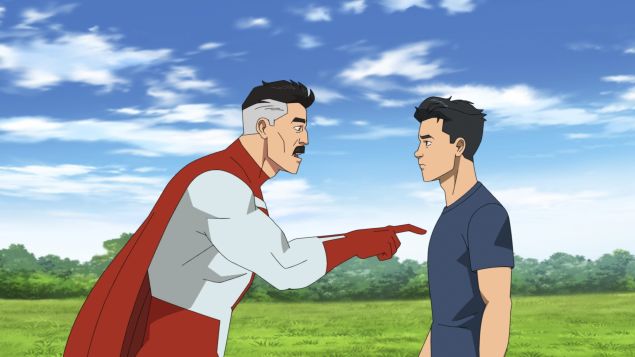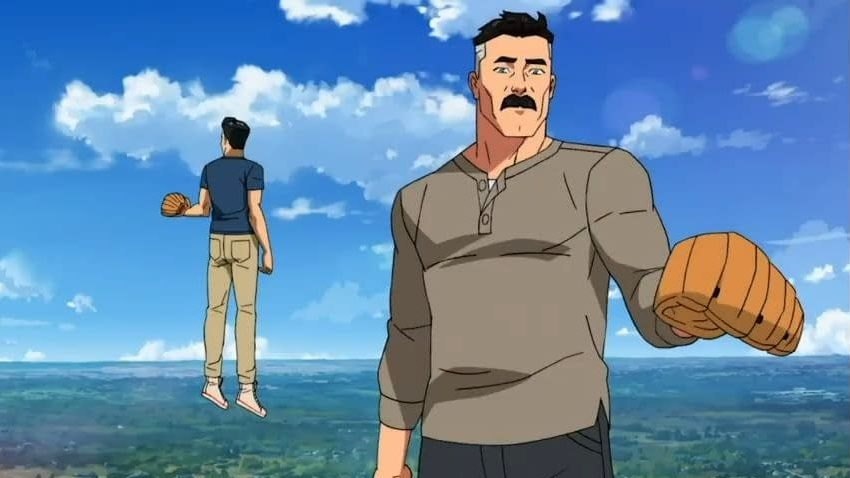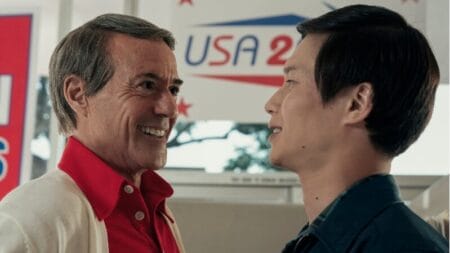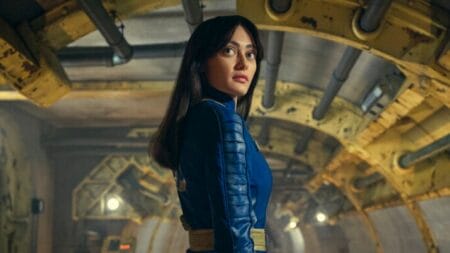It is no exaggeration to say that the cast of Invincible may be the most stacked we have ever seen. In their leads, they have a 2021 Oscar Nominee for Best Actor in Steven Yeun, and an Oscar Winner for Whiplash in J.K. Simmons. In their supporting cast, they have names from some of the biggest TV shows of our time, with Gillian Jacobs from Community, Zazie Beetz from Atlanta, and Jason Mantzoukas from Brooklyn Nine-Nine. And this is before you even touch on Mark Hamill and Michael Dorn, both of whom are top-tier nerd royalty in their own way.
To no surprise with this level of a cast, Invincible is absolutely incredible, and looks set to be huge success for years to come. As such, it was a huge honor to get to sit down with this group of fantastic voice-actors during the show’s official press tour. We chat with Steven Yeun, J.K. Simmons, Zazie Beetz, and Gillian Jacobs on their connection to these characters and Robert Kirman’s best-selling comic. The following is taken from a press roundtable with the cast of Invincible. Questions asked by DiscussingFilm will be labelled.

DiscusingFilm: Now more than ever, it’s so important for women and young girls to see strong female representation on screen, and in both characters of Amber and Atom, they very much get that. How do you feel getting to take on these roles that so many young girls and people watching will get to look up to?
Zazie Beetz: I think that Amber is, without being a superhero, a really strong and confident character. And I think that’s sort of important what Robert [Kirkman] did with her, is that you don’t have to be a superhero to be a good influence in the world and to also have confidence and be sure of yourself. Which, in some ways, you know, we look up to Wonder Woman and we look up to these characters, but it’s also okay to not be that and to just be yourself, which is what Amber is. So I think that’s an important element for me specifically.
Gillian Jacobs: Yeah, I directed this documentary where I interviewed all these women who had written, edited, and illustrated comics and talked about also the impact of those characters on the readers. One of my favorite parts of that was the character Ms. Marvel, Kamala Khan, who is getting her own Disney+ series now. And so I hadn’t really thought about that in terms of my own role on this show! But I have heard people talk about, you know, the impact that characters like these have on them. So yeah, you’re making me think about that for the first time.

For Gillian and Zazie, because your characters both meet Mark in very different ways, what would you say was your character’s first impression of him?
Gillian Jacobs: Well, I think for my character, they’ve been at the same school for probably a while, but maybe she didn’t notice him before. Or they have a new dynamic now that he is coming into his superpowers. So it’s sort of like they’re meeting for the first time even though they’ve gone to the same school for a while.
Zazie Beetz: And I think that my first real impression of Mark is like impressed in a way, like he sort of stands up for me when another kid is sort of harassing me. And yeah, that draws me into talking to him and interacting with him. So I suppose my first impression was impressed.
For J.K., in stepping into the role as a father, what you were able to bring? And then Steven, playing a 17-year old, were you able to hash out some old teen memories in that role?
J.K. Simmons: The father son thing was definitely part of what appealed to me about doing this in the first place. And being the father of a 17-year old, I mean, what is it almost two years ago that we were recording this. You know, my own son was 19 or 20 at the time, my daughter was 17. So it was very much that aspect of it. And the fact that it was really well-written, that aspect of it made it just really accessible to me and something I felt a connection to. And then being able to play the scenes with Sandra [Oh] and Steven [Yeun], which the vast majority of my work was with the two of them. They’re both really wonderful actors that I was already familiar with, and I just had the confidence that it would be a good time, and we do some good work.
Steven Yeun: For me, I think I’m very lucky that I also am now a father. I think maybe the merging of perspective wasn’t really fully there until that happened for me. So it was really cool to access that in the middle of it. So yeah, going back to being a 17-year old is not fun sometimes, but also, it’s very real. And in some ways, you know, it’s fun to play because there’s a lot of things that perhaps I had also wanted to talk to my father about. And so getting to play that out in this way, with someone as incredible as J.K., I think that’s the cool part – the simulated reality of that relationship is fascinating.


For J.K., you’ve played some pretty complex roles before, with Counterpart coming to mind. How does that inform your role of Nolan because there’s obviously things that go one way and some that go the other.
J.K. Simmons: Obviously, for the dozens of people who actually saw Counterpart, I was actually playing two distinctly different versions of the same character who lived in parallel worlds. And I’ve spoken about this before, that sort of Jekyll and Hyde aspect of playing those two different characters really comes into play surprisingly often now that I think about it. Certainly in the case of Nolan, there are aspects of him that are revealed as the show goes along that I don’t want to get into, but I think in the world that Robert has created, it’s easy. But yes, there is a complexity as can often be, in well-written animated stuff, even more complexity than you often find in live-action stuff that you’re doing because there are virtually no boundaries for the creators which must be fun.
For Steven, how much of the actual source material did you read, to find a touchstone to make Mark relatable to you? And if you can, let us know if there was a specific thing that informed that.
Steven Yeun: I actually first read the comics when I was on The Walking Dead. Getting to befriend Robert, I just dove into his work. And, you know, I think he wrote something true. Sometimes the journey of father-son relationships is like, you got to try to pin your father down one time or try to like beat him in an arm wrestling contest, or whatever it is. That journey is always interesting, coming out of the shadow of someone that helps form you – realizing yourself is a universal journey I think for all people. So there wasn’t necessarily a touchstone that I pinned the experience on I think, it was really just knowing what it’s like to be a son. And then also now knowing what it’s like to be a father and the dynamics and feelings that are all intertwined in that space. That was really fun to rely on.




